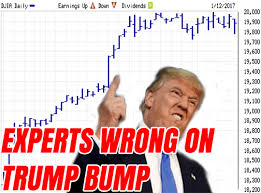Anyone watching the markets recently has seen a marked reversal from the initial Trump Optimism. The recent “great healthcare” reform promised by the president imploded. Because of this implosion and implications on future tax measures. There are 4 immediate implications to real estate to be aware of.
The Trump Bump has hit a major speed bump with markets pricing in the “Alternative facts” of the new presidency. This market uncertainty is creating a difficult environment for various industries including real estate. Markets are trying to price in “risk” but have no clue how to price in the large “uncertainty” from this administration. Because of this uncertainty there are 4 areas to watch for real estate impacts (both positive and negative) that could alter your plans.
- Stock market/investor confidence: What does the markets recent decline mean? How will this impact residential real estate? Consumer sentiment is a large driver of the residential market with consumer confidence hitting a new all time high according to a recent Fannie Mae home purchase sentiment index. According to the press release: “ The latest post-election surge in optimism puts the HPSI at its highest level since its starting point in 2011” Unfortunately this where the party gets interesting. Immediately after Brexit consumer optimism increase as the reality began to set in of what this means for the British economy consumer confidence rapidly turned negative with 6 in 10 people pessimistic about the future. If Britain is an indicator, the markets have priced in optimism that will be difficult to sustain. The loss of healthcare reform is a stark indicator that other promised reforms will be extremely difficult even with the republicans in full control. The recent decline in the markets will trickle down to consumer sentiment and ultimately residential purchase activity. This likely will start at the high end as this group is more heavily tied to the equities markets.
- Market Uncertainty: Companies can price in risk, unfortunately there is no way to account for uncertainty. The market uncertainty is making it harder to plan for large commercial purchases. For example, let’s say you are a large manufacturer. To build a plant and get it up and running is a multi year process, will this investment pay off? What if there is a border tax? What does this mean to your suppliers? What if the border tax doesn’t happen, would it be better to build abroad? There are more questions than answers impacting all realms of commercial property (hotels, office, plants, etc…). This uncertainty is hamstringing customers.
- Interest rates likely will not rise as quickly
- Oil prices have a strong correlation with inflation/future expectation of the economy. Oil prices have recently dropped to their lowest level in 2017. This is due to increased supply and at the same time decreased demand. Predictions are that oil prices will settle 20% less than today.
- Along with oil, there were high expectations that Trumps stimulus plan would lead to a faster pace of growth in the GDP. With the hard time on healthcare, chances are dimming on a major tax overhaul. The market is pricing in a much more subdued tax proposal. The market is also coming to terms with reality that GDP likely will not increase substantially more due to various structural market forces.
Low oil prices along with a smaller stimulus package will allow rates to rise in a more moderate fashion. This should help the real estate market.
- Dollar not strengthen as much: As rates were predicted to rise substantially, the dollar was on its path to follow higher. This was further enhanced by a proposed “border tax adjustment” that would further strengthen the dollar. With rates moderating and the border tax adjustment in doubt, the dollar has also fallen lower. Why is this important for real estate? As the dollar strengthens purchasing power of international buyers decreases. In a nutshell as the dollar strengthens, US real estate becomes more expensive. As the dollar weakens, US real estate is becoming more attractive to foreign investors so this could be a good sign for international buyers of US assets.
What do you do? The answer depends on your objectives including timelines, business needs, etc… The current environment no doubt is difficult to plan for with the huge uncertainty of both micro and macro factors. The best advice might be to sit on the sidelines if you can to wait for the dust to settle.
Sources:
https://www.stlouisfed.org/on-the-economy/2015/october/predicting-impact-oil-prices-inflation

